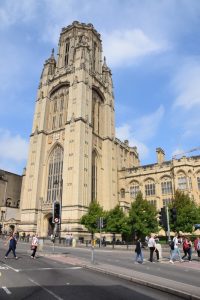
We spoke with Rebecca Scott MBE – cofounder of the BAME Staff Network and Employability and Opportunity Manager at the University, to talk about the Network and Black History Month
Can you tell us a bit about the founding of the BAME Staff Network?
We didn’t have a network to represent the racially and minoritized groups within the University. So Nishan Canagarajah and Tracy Brunnock popped out a call in the Staff Bulletin, asking for people to come and discuss the opportunities of having a network.
Nishan was the chair of a Race Task Force that had come into place in 2017 after some awful incidents. In one, two of our students were walking and some of our other students walking behind them decided to make monkey noises. This was reported to the police. It made the national news, and the race task force was set up.
Michelle Alexis, who has now moved on, and I were asked if we would like to be the Co-chairs of this new group and have the pleasure of getting it off the ground.
The Network now has 144 current members.
What are some of the initiatives the Network has been involved in?
We aimed to collect information around how people felt as an employee working at the University, look at recruitment and staff progression, representation, or lack of it. That led to the work around diversifying our workforce and looking at positive action initiatives that target racially minoritized groups, particularly those from Black African or Caribbean backgrounds who are underrepresented across the University.
Has the University made enough progress with diversification?
I have some great colleagues and some days and I think we’re making progress, on other days, and I wander around our campus and get scowled at by people that perhaps think I shouldn’t be there. Then you think, no, we haven’t made any progress.
Until our workforce reflects our City we still have lots of work to do.
I have experienced living in a very discriminative society. It’s important to consider how you bring in structures and systems in the workplace to reduce and prevent against discrimination that in turn increases areas of disparity.
What are some of the challenges the Network has faced?
Being Black, or an ethnic minority at the University is quite challenging. But it’s not just being Black at the University that is a challenge, it’s existing as a Black person in our society.
Black History Month is an example of that. Black people are often asked to do work for free, to educate others about traumatic periods of time, such as our enslavement, that are a very small part of our history, even if it was a large part of White British History.
It would be great to focus on a more diverse Black History Month that informs, promotes and shares our positive legacy and history?
The University recently posthumously recognised Roy Hackett with an honorary doctorate. Does the University have plans to honour any of the other people that took part in the Bristol bus boycott?
I’m not actually directly involved with the nomination process. I have had the pleasure of working with Lawrence Hoo, who is getting honorary doctorate in November. Whilst a lot of people know him as a poet and a Black history educator and founder of CARGO Classroom, he was the driving force that got the law changed to prevent having accommodation housing sex offenders within a certain distance of places that provide childcare. This was a result of a paedophile hostel right next to the door to the nursery on Brigstock Road in Saint Pauls.
At present, nominations have to come from a University member of staff. It would be great if we can encourage the public to work with the University staff to make a nomination? I think it would be a great way for staff to get to know different communities.
How do you feel about the University’s plans to change the names of some of its buildings?

I’ve been speaking to younger members of the City about this, but I’ve approached it in terms of “You’re a board member and this is the decision you’ve got to make. Here are some people’s views, you’ve got to decide where it’s best to spend your money.”
We are often not considered as an employer or place to study so many said they’d rather that any available funding is used towards the scholarship fund and give out more scholarships or for employment related support. They don’t care what the building’s going to be called if they haven’t or can’t go in it.
Some of us are quite traditionally academic and enjoy an academic debate or other discussion, but is this the best use of limited money and resources? Our future customers and workforce have different interests and priorities and I feel it is important that their voices are key in making our decision.
Huge thanks to Rebecca for sharing these insights into the BAME Staff Network. Please contact student-comms@bristol.ac.uk if you have a story you would like to share on this blog for Black History Month, and beyond…!
Note: The BAME Network will be renamed over the coming year to adopt a more neutral term that will reference all the ethnic minority groups.

